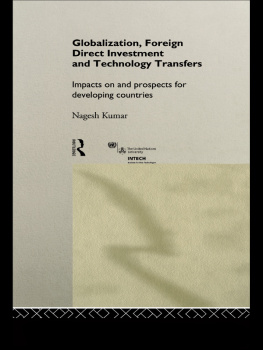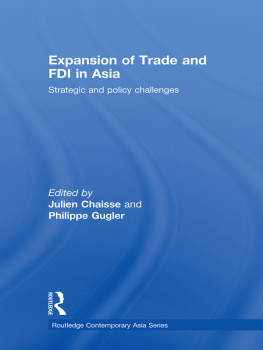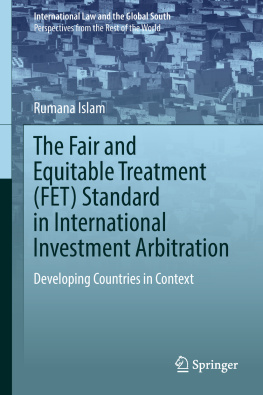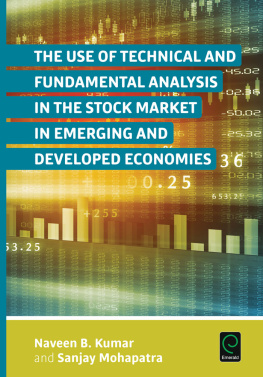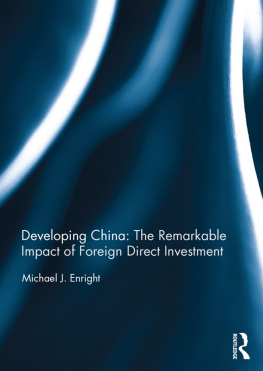GLOBALIZATION, FOREIGN DIRECT INVESTMENT AND TECHNOLOGY TRANSFERS
The impact of globalization during the past decade has been uneven across regions, countries and sectors. While many countries have become more integrated into the world economy, increasing their cross-border transactions, others have been left behind. Foreign direct investment (FDI) inflows and technology transfers are increasingly concentrated in a handful of countries, while the least developed countries continue to be marginalized, despite the liberalization of their investment regimes. Globalization, Foreign Direct Investment and Technology Transfers discusses emerging patterns and directions of FDI and technology transfers and the growth prospects for developing countries in this context of globalization.
In this study, leading scholars on the subject examine and explain the emerging patterns in international technology transfers and FDI flows over the past two decades. They analyse the trends in internationalization of corporate activity in major conventional and emerging source countries of FDI to comment upon the prospects for outflows. This departs from the existing treatments of FDI as a homogeneous resource and allows for a more detailed prediction of future outflow patterns. Throughout, the research focuses upon the implications of new trends for developing countries. Kumar concludes by outlining the policy implications for the governments of such countries seeking to mobilize technology and FDI for their industrialization and further integration into the international community. Controversially, he cautions against excessive optimism about the potential of FDI inflows as an agent of development.
Globalization, Foreign Direct Investment and Technology Transfers draws together much data and information which is not readily available and provides reflections upon international business negotiations from a developing countrys perspective.
Nagesh Kumar is currently Senior Fellow at the Research and Information System for Developing Countries, New Delhi, India. From 1993 to 1998, Dr Kumar served on the faculty of the United Nations University Institute for New Technologies, Maastricht, the Netherlands and directed its research on foreign direct investment and technology transfers.
UNU/INTECH STUDIES IN NEW TECHNOLOGY AND DEVELOPMENT
Series editors: Charles Cooper and Swasti Mitter
The books in this series reflect the research initiatives at the United Nations University Institute for New Technologies (UNU/INTECH) based in Maastricht, the Netherlands. The institute is primarily a research centre within the UN system and evaluates the social, political and economic environment in which new technologies are adopted and adapted in the developing world. The books in the series explore the role that technology policies can play in bridging the economic gap between nations, as well as between groups within nations. The authors and contributors are leading scholars in the field of technology and development; their work focuses on:
- the social and economic implications of new technologies;
- processes of diffusion of such technologies to the developing world;
- the impact of such technologies on income, employment and environment;
- the political dynamics of technological transfer.
The series is a pioneering attempt at placing technology policies at the heart of national and international strategies for development. This is likely to prove crucial in the globalized market, for the competitiveness and sustainable growth of poorer nations.
WOMEN ENCOUNTER TECHNOLOGY
Changing Patterns of Employment in the Third World
Edited by Swasti Mitter and Sheila Rowbotham
IN PURSUIT OF SCIENCE AND TECHNOLOGY IN SUB-SAHARAN AFRICA
The Impact of Structural Adjustment Programmes
Edited by John Enos
THE POLITICS OF TECHNOLOGY IN LATIN AMERICA
Edited by Maria Ins Bastos and Charles M.Cooper
EXPORTING AFRICA
Technology, Trade and Industrialization in Sub-Saharan Africa
Edited by Samuel M.Wangwe
TECHNOLOGY, MARKET STRUCTURE AND INTERNATIONALIZATION
Issues and Policies for Developing Countries
Nagesh Kumar and N.S.Siddharthan
FLEXIBLE AUTOMATION IN DEVELOPING COUNTRIES
The Impact on Scale and Scope and the Implications for Location of Production
Ludovico Alcorta
GLOBALIZATION, FOREIGN DIRECT INVESTMENT AND TECHNOLOGY TRANSFERS
Impacts on and Prospects for Developing Countries
Nagesh Kumar and collaborators
First published 1998 by Routledge
11 New Fetter Lane, London EC4P 4EE
This edition published in the Taylor & Francis e-Library, 2003.
Simultaneously published in the USA and Canada by Routledge
29 West 35th Street, New York, NY 10001
1998 UNU/INTECH
All rights reserved. No part of this book may be reprinted or reproduced or utilized in any form or by any electronic, mechanical, or other means, now known or hereafter invented, including photocopying and recording, or in any information storage or retrieval system, without permission in writing from the publishers.
British Library Cataloguing in Publication Data
A catalogue record for this book is available from the British Library
Library of Congress Cataloging in Publication Data
A catalogue record for this book has been requested
ISBN 0-203-19362-8 Master e-book ISBN
ISBN 0-203-26549-1 (Adobe eReader Format)
ISBN 0415191114 (Print Edition)
FIGURES
TABLES
APPENDICES
Appendix 3.A1 The growth of inward FDI flows, 197580 and 19905 86
Appendix 3.A2 Changing share of FDI inflows to gross domestic capital formation, 197680 and 19904 88
Appendix Table 4.A1 Nominal GDP of developing countries by region and country, 197794 120
Appendix Table 4.A2 Nominal gross product of US non-bank MOFAs in developing countries by region and country, 197795 121
Appendix Table 4.A3 Manufacturing nominal GDP in developing countries by region and country, 197794 122
Appendix Table 4.A4 Gross product of US manufacturing MOFAs in developing countries by region and country, 197795 123
Appendix Table 4.A5 Sales of US MOFAs in developing countries by region and country, 197795 124
Appendix Table 4.A6 Sales of US manufacturing MOFAs in developing countries by region and country, 197794 125
Appendix Table 4.A7 US exports shipped to MOFAs by parents, 197794 126
Appendix Table 4.A8 US manufacturing exports shipped to MOFAs by parents, 197794 127
Appendix Table 4.A9 Manufacturing gross product of MOFAs, 1994 128
CONTRIBUTORS
Dr Jamuna P.Agarwal is a Senior Economist at the Kiel Institute of World Economics in Kiel, Germany.
Professor John H.Dunning has held chairs in international business at the University of Reading, UK, and at Rutgers University, USA. He has also been associated with UNCTAD as the Senior Economic Adviser for its Programme on Transnational Corporations.
Dr Nagesh Kumar is currently Senior Fellow at the Research and Information System for Developing Countries, New Delhi, India. From 1993 to 1998, Dr Kumar served on the faculty of the United Nations University Institute for New Technologies, Maastricht, the Netherlands. He received the Exim Bank of Indias first International Trade Research Award for his book Multinational Enterprises in India: Industrial Distribution, Characteristics and Performance, also published by Routledge in 1990.

